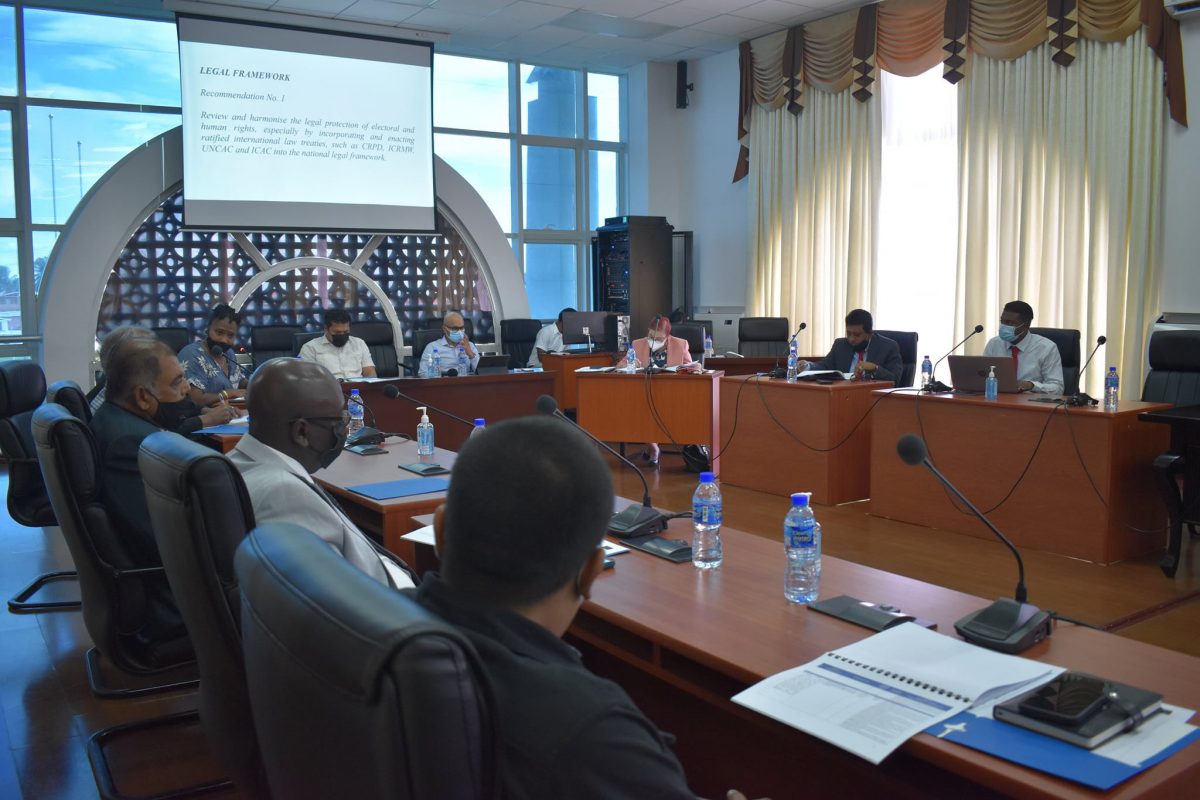The European Union Election Observation Mission (EU EOM) last week organized a Stakeholder Roundtable to receive feedback on its Final Report and Recommendations on the March 2020 General and Regional Elections and according to Attorney General Anil Nandlall everyone present committed to reform.
“Everyone present in the room expressed recognition for the need to reform Guyana’s electoral legislation,” he said of the March 22 meeting at the Arthur Chung Conference Centre. He reiterated that the PPP/C government is reviewing the EU EOM’s recommendation along with all the other recommendations made by all other observer groups.
“I’ve indicated before that all recommendations will be considered in the exercise of drafting amendments to our electoral legislation,” the AG said.
Last week Chief Observer of the EOM Urmas Paet told a press conference that now is the time for decisions and actions on electoral reform.
“For election reform to be effective its implementation needs to begin well before the next elections are called. (An) inclusive and transparent reform process helps build confidence in elections and their results,” he stressed.
The stakeholders’ roundtable was part of the EOM’s attempt to kick-start that process among those invited were the President, Opposition Leader, Speaker and Deputy Speaker of the National Assembly, the Attorney General, Chief Justice, Minister of Foreign Affairs and Chair of the Guyana Elections Commission (GECOM). The entities were to be joined by other constitutional commissions, civil society and media at the roundtable.
Stabroek News understands that GECOM Chair, retired Justice Claudette Singh was not present at the roundtable. In fact the Commission as a body was not represented since a decision was taken that the entity would not participate.
Commissioner Sase Gunraj however attended in his “personal capacity” and told Stabroek News that it was a “decent engagement which could’ve been more meaningful but for the grandstanding of some participants.”
“I welcome the report as it highlighted several areas of concern that I pointed out as they were occurring a year ago… [while] most of the recommendations have to be dealt without outside of GECOM. There’s a recommendation (No. 23) which deals with the need for an urgent dispute resolution mechanism. This is implementable administratively and it is something that ought to be looked at in short order,” he noted, adding that the Commission has not yet discussed the report with a view of implementing any of its recommendations.
The recommendation referenced calls for the establishment of a comprehensive election dispute resolution system to ensure effective and timely remedies throughout all stages of the electoral process.
According to the EOM report Guyana’s case-law has established that once the date of elections is officially announced, all election-related disputes should be raised only after the elections by way of election petitions which does not provides time limits for completion of the adjudication.
“Although pre-election matters can be adjudicated via constitutional challenges these also do not have election specific time frames for rendering decisions. There is [also] no mechanism for formal complaints to be lodged with GECOM except for as part of the voter registration ‘claims and objections’ period,” the report said.
Other recommendations related to the operations of the GECOM Secretariat include the need to adopt clear written procedures for the transmission and tabulation of election results, notably to ensure consistency of the process in all regions, adequate traceability of handed over electoral documents, and the possibility for all authorised stakeholders to examine Statements of Poll as required by law.
Further the EOM has recommended that Guyana incorporate into law the obligation to accompany any declaration of results by simultaneous publication of detailed polling station results and digital copies of all Statements of Poll. In addition to the number of valid votes cast for each candidate list, these detailed results should also include all elements of electoral accounting to allow control of their coherence, such as number of registered voters; voters who voted; rejected ballots; spoiled ballots and more.






